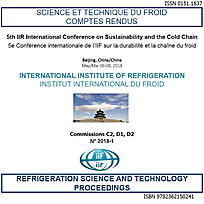
IIR document
Effects of door openings during deliveries in refrigerated transport.
Number: pap. 7
Author(s) : SUQUET T., CAPO C., LATCHAN F., et al.
Summary
Deliveries of products under temperature controlled in urban areas consume a large rate of energy. In distribution, doors openings during the unloading of the goods cause the infiltration of a significant heat load. This heat load is responsible of several indesirable phenomena, such as the condensation of water vapour and the production of frost on the walls and within the evaporator of the vehicle. The temperature inside the vehicle increases, differing from the required value for the proper transport of the perishable products and the cold chain may be compromised. The authors are interested in finding a dimensioning method for
refrigerated equipment involved in the distribution of perishable goods, including solutions for maintaining the quality of these products. The present paper is the first part of an experimental study of the influence of door openings on the recovery time of the refrigerated vehicle components. This experimental study is articulated in two different steps: the first step is related to a field test realized in Paris area, the second one concerns an experimental campaign carried out in the Cemafroid laboratory test station. The results of the field tests and the test methodology followed by the laboratory are presented in this paper.
Available documents
Format PDF
Pages: 8
Available
Public price
20 €
Member price*
Free
* Best rate depending on membership category (see the detailed benefits of individual and corporate memberships).
Details
- Original title: Effects of door openings during deliveries in refrigerated transport.
- Record ID : 30023342
- Languages: English
- Source: 5th IIR International Conference on Sustainability and the Cold Chain. Proceedings: Beijing, Chine, 6-8 avril 2018
- Publication date: 2018/04/06
- DOI: http://dx.doi.org/10.18462/iir.iccc.2018.0007
Links
See other articles from the proceedings (72)
See the conference proceedings
Indexing
-
Themes:
Road transport;
Cold chain, interfaces - Keywords: Opening; Refrigerated transport; Temperature; Door; Expérimentation; Thermal load; Distribution; Sizing
-
Transport refrigeration food safety and quality.
- Author(s) : MURDOCK M. J.
- Date : 2003/08/17
- Languages : English
- Source: 21st IIR International Congress of Refrigeration: Serving the Needs of Mankind.
- Formats : PDF
View record
-
Multi-temperature transport unit refrigeration ...
- Author(s) : CHOPKO B., STUMPF A., VALENTIN B.
- Date : 2003/08/17
- Languages : English
- Source: 21st IIR International Congress of Refrigeration: Serving the Needs of Mankind.
- Formats : PDF
View record
-
50 Jahre Transfrigoroute International: Ein Que...
- Author(s) : GAC A., ROTHEN B.
- Date : 2005/09/22
- Languages : English
- Source: Transfrigoroute International, 50 Jahre, 1955-2005. Jahresversammlung, Amsterdam, 2005./ Transfrigoroute International, 50 years, 1955-2005. Annual meeting, Amsterdam, 2005./ Transfrigoroute International, 50 ans, 1955-2005. Assemblée annuelle, Amsterdam, 2005.
View record
-
Situation and perspectives of evolution of the ...
- Author(s) : FERTEL C., CAVALIER G., ENGELMANN P.
- Date : 2023/08/21
- Languages : English
- Source: Proceedings of the 26th IIR International Congress of Refrigeration: Paris , France, August 21-25, 2023.
- Formats : PDF
View record
-
Effect of forced-air cooling, low temperature s...
- Author(s) : YAN C., LIU S., JIA L., et al.
- Date : 2015/08/16
- Languages : English
- Source: Proceedings of the 24th IIR International Congress of Refrigeration: Yokohama, Japan, August 16-22, 2015.
- Formats : PDF
View record
